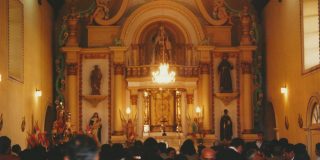The devastation in the Philippines is overwhelming. Houses flattened. Massive loss of life. Pain and grief. So where was God when all this was happening?
This question gets asked over and over in the Bible. “My God, my God, why have you forsaken me?” cries the Psalmist. “O Lord, how long shall I cry for help, and you will not listen? Or cry to you ‘Violence!’ and you will not save?” complains the prophet Habbakuk. “Sovereign Lord, holy and true, how long will it be before you judge and avenge our blood on the inhabitants of the earth?” plead the martyrs of Revelation.
Thousands of years later I find myself asking the same question, and I am no closer to an answer than they were.
I do however learn from this history of painful bewilderment.
First, I learn to reject simplistic answers. There will always be some like Job’s friends, who will try to explain suffering within the confines of a narrow theology. Job’s friends thought God governed the universe with simple moral logic: evil was punished and goodness was rewarded. On this logic earthquakes, violence, and typhoons are tools by which God punishes. Their theology was condemned by God at the end of the book.
Second, I learn that there are no answers known to us. I take it this is one of the central themes of Job. The reason Job suffers is unbeknown to him or his friends. They employ all their powers of wisdom to find out but to no avail. I suspect that more often than not there is no divine reason for events like typhoons. They’re morally purposeless, generated by the interaction of blind physical forces. But even where there may be some purpose, we will never know it.
Third, like Job, I can choose to trust God or not to trust. In a key chapter (chapter 28) I read
‘Where then does wisdom come from?
And where is the place of understanding?
21 It is hidden from the eyes of all living,
and concealed from the birds of the air.
22 Abaddon and Death say,
“We have heard a rumour of it with our ears.”
23 ‘God understands the way to it,
and he knows its place.
24 For he looks to the ends of the earth,
and sees everything under the heavens.
25 When he gave to the wind its weight,
and apportioned out the waters by measure;
26 when he made a decree for the rain,
and a way for the thunderbolt;
27 then he saw it and declared it;
he established it, and searched it out.
28 And he said to humankind,
“Truly, the fear of the Lord, that is wisdom;
and to depart from evil is understanding.”’
That’s it. In the absence of knowledge, I either choose to give myself over to a good, powerful and wise Creator, or I do not. I either walk away from faith or I trust that I see enough of God in Jesus that I can trust in the goodness of God.
Finally, I am driven to hope. Jesus added something Job didn’t know – that God will create a new heavens and earth where all suffering has ceased.







Hey Scott, Great piece, as always. The thing I’ve never understood about the story of Job is that we, i.e. the reader, understand exactly why he was suffering. Ok, so Job doesn’t understand, and the moral is to trust God in suffering because our minds are incapable of seeing the world as God does. I get that. But in this story we see why Job suffered: because God literally made a bet with the devil! It seems totally irresponsible of God. Job’s immense suffering was completely preventable. In fact, you could argue that his suffering was partly God’s fault. Why… Read more »
Hi Luke, Unlike Job and the friends who arrive to comfort him, readers know exactly why Job is suffering. We have been privy to an exchange between God and Satan in which we discover that Job suffers not because he is wicked but because he is good. The story portrays angelic beings gathered around God. One, known as The Accuser, suggests that the only reason Job worships God is because of all the good things God has given him. Take these away and Job will soon turn his back on God. In making this claim the Satan challenges the honour… Read more »
If human induced climate change is changing our climate and triggering catestrophic events is not humanity (not the specific people who may suffer) to some extent reaping what we have sown…